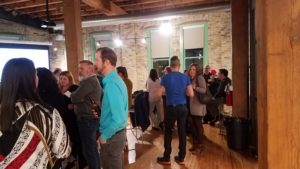Last spring, with funding from Northwestern Mutual, we conducted interviews with teachers and mentors involved with MPS’s efforts to introduce Project GUTS, SHARP Literacy’s Design Through Code (DTC) program, TEALS, and First Robotics. The goal was to understand how we might expand opportunities to develop computational thinking outside of computer science classes, by listening to what drew teachers and mentors already engaged in that type of activity to take on the task. We provided a recap of that work here.
One of the ideas that came out of that effort was to work with teams of teachers and expertise from the broader community to create and pilot real world projects that provide solid opportunities to engage students in computational thinking. We call that the STEM Studio, and are happy to report that Northwestern Mutual has provided funding to design and pilot the first projects with MPS.
Since environmental science is a spring semester focus for MPS middle schools, we used our November Collab Lab on Green Infrastructure to generate ideas for potential projects. One of those is the Southeastern Wisconsin Watershed’s Trust’s (Sweetwater) Adopt a Storm Drain Program. As we talked about what that might look like as a STEM Studio project, Sweetwater pointed us to the Smart City Reverse RFP offered by Caravela IoT. That initiative seeks to demonstrate the potential to leverage a network of sensors that detect environmental data. Winning submissions would receive both equipment and technical support to pilot a project. We partnered with MPS, Sweetwater and Reflo to put in a joint proposal which uses STEM Studio pilot projects to both deploy sensors and expose students to the technology. We were selected as one of the winners and are happy to now have Caravela IoT engaged with us in the STEM Studio effort.
Over the next few weeks we’ll be pulling our teams of teachers together with community partners to design and pilot the experiences we want students to have as they take on the STEM Studio projects. Collab Lab attendees will know that one of our criteria for projects we get involved in is the ability to scale across schools with network effects. As part of the STEM Studio pilots, we’ll work with the teams to reflect on what worked, what didn’t, and what the next cohort of teachers will want to have in place to take on or extend the challenge in their schools.


